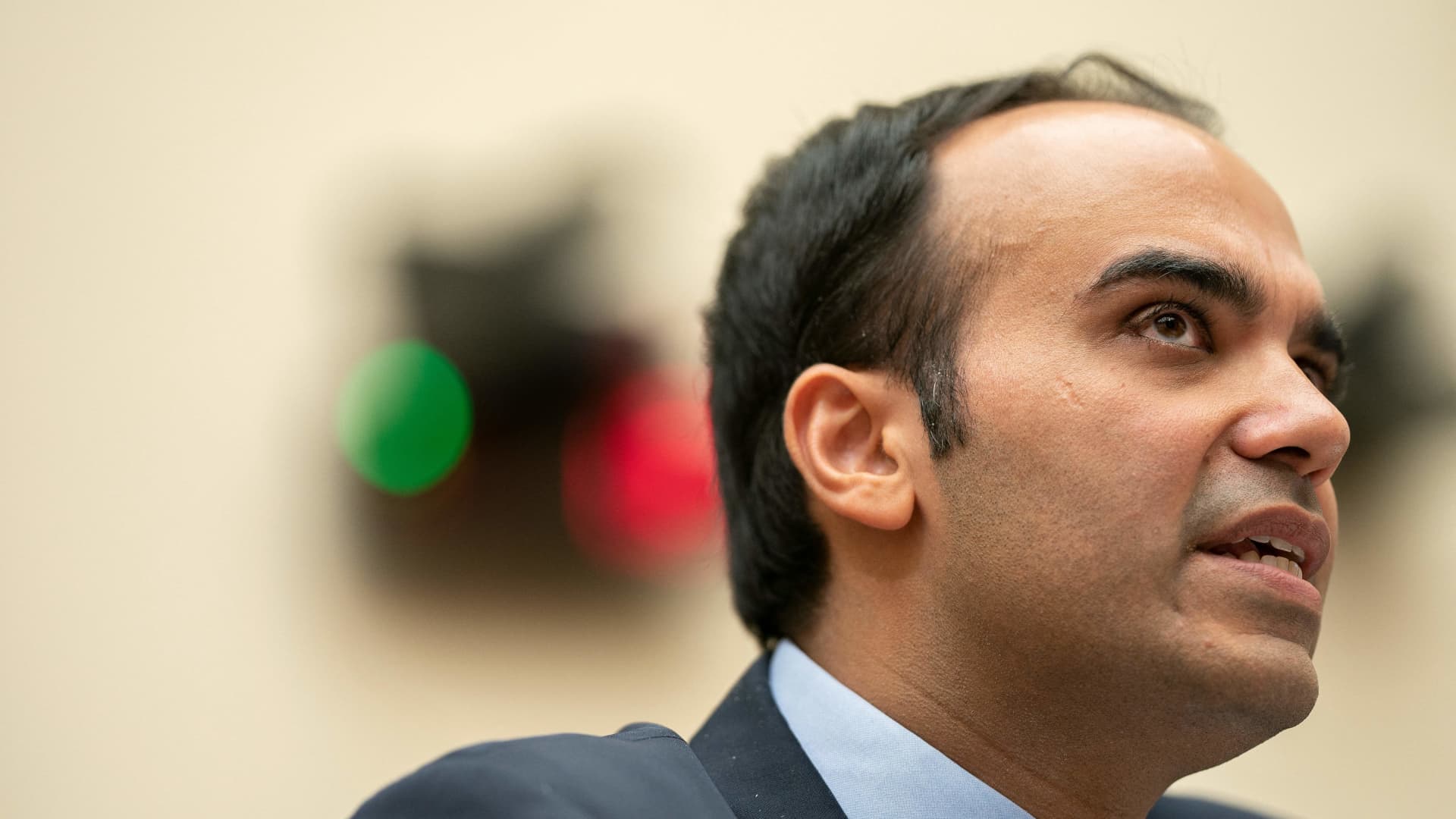Rohit Chopra, director of the Consumer Financial Protection Bureau, testifies during a Senate Banking, Housing and Urban Affairs Committee hearing on April 26, 2022.
Tom Williams | Cq-roll Call, Inc. | Getty Images
Rohit Chopra has lofty plans for the Consumer Financial Protection Bureau to tackle artificial intelligence threats, medical-debt reporting, exorbitant credit card fees and other so-called junk surcharges.
But that agenda is under threat by a legal argument targeting the agency’s funding structure, which a federal appeals court ruled unconstitutional last year. When the CFPB was created 12 years ago as a response to the global financial crisis, Congress chose to fund it through transfers from the Federal Reserve Board of Governors instead of appropriations.
Republican lawmakers have panned the agency’s concept for years. Among its harshest critics is Rep. Andy Barr, R-Ky., who has called the CFPB “the most unchecked, unaccountable agency in the whole federal government.” He has accused Chopra of acting “unilaterally and arbitrarily” without proper oversight.
The Supreme Court is slated to hear the appeal to the lower court ruling in early October.
The potential “avalanche of litigation” and corresponding uncertainty injected into the market are top concerns for Chopra, who was appointed CFPB director in October 2021.
“This is not the first time the CFPB has been subjected to these attacks,” Chopra told CNBC in an interview this week. “And it has emerged to continue to do its important work for the public.”
With that in mind, Chopra laid out some of the CFPB’s top policy objectives in the coming months:
Consumer debt
Consumer debt will reach or exceed the trillion-dollar mark this year, according to Chopra, with credit card debt and auto loans making up the bulk of that amount.
“New and used cars really surged in price during the pandemic and many people took on big auto loans to do that,” Chopra said. The agency will target unnecessary repossessions in the auto loan market, he said.
Chopra also expects the restart of student loan payments in October to affect consumer credit markets.
“We have already done some initial analysis to suggest that there are a set of student loan borrowers who are already struggling on their credit card or auto loans,” he said. “So, we would anticipate that could potentially get worse.”
The CFPB, in partnership with the Education Department, will target the student loan servicers responsible for payment plans and collections to encourage alternatives to the standard repayment plan, such as an income-driven model that allows borrowers to pay on schedule and avoid delinquency.
“We’re also talking frequently to state attorneys general and state regulators to make sure that those student loan-servicing companies are holding up their end of the bargain,” Chopra said.
Medical debt
Chopra said that tens of millions of Americans are battling medical debt. One in five is affected by a total $88 billion in unpaid medical bills currently in collection, according to CFPB reporting.
Total U.S. medical debt reached over $195 billion in 2019, with about 100 million adults owing roughly $500 to over $10,000 in debt, according to a 2022 report by the Kaiser Family Foundation.
“Medical debt has ballooned as a pain point for Americans,” Chopra said. “They often are stuck in all sorts of red tape between their insurance company (and) the hospital.”
The crisis is compounded by debt collectors that add medical debt to credit reports as a means of coercion. Chopra said the CFPB is “looking hard about whether it’s appropriate for medical debt to be on your credit report.”
The agency has already ordered these companies as well as credit-reporting agencies to stand down on collecting, furnishing or reporting on invalid medical debt. Equifax, TransUnion and Experian have obliged with applicable policy changes.
Junk fees
The CFPB recently fined Bank of America roughly $150 million for illegally double-charging some of its customers for insufficient account balances. The action is the latest taken by the agency to address the Biden administration’s aims toward reducing junk fees, or extraneous surcharges for goods and services.
“We want to make sure that these illegal junk fee practices are eradicated from the market,” Chopra said. “A junk fee is often something that is charged, where you’re getting no service whatsoever, you didn’t want it or it’s not priced in a way that is subject to fair competition.”
The agency’s crackdown on junk fees has prompted some policy changes at big banks, he added.
“Many of them are getting rid of their reliance on junk fees and making their fees much more reasonable,” Chopra said. “I think we’ve seen over the past year and a half changes that are leading to billions of dollars in fewer fees on an annual basis.”
GOP members of the House have criticized Chopra’s credit card fee policies. Rep. Blaine Luetkemeyer, R-Mo., has said the CFPB has “no authority” on the issue because junk fees is not a legal term.
“Because there is no such word out there. There is no authority. So, I think we as a group need to be pushing back,” said Luetkemeyer, who sits on the House Financial Services Committee.
Artificial intelligence
Chopra is also concerned that artificial intelligence could disrupt banking in a negative way for consumers.
If companies use AI for loan verifications, for example, they would run

